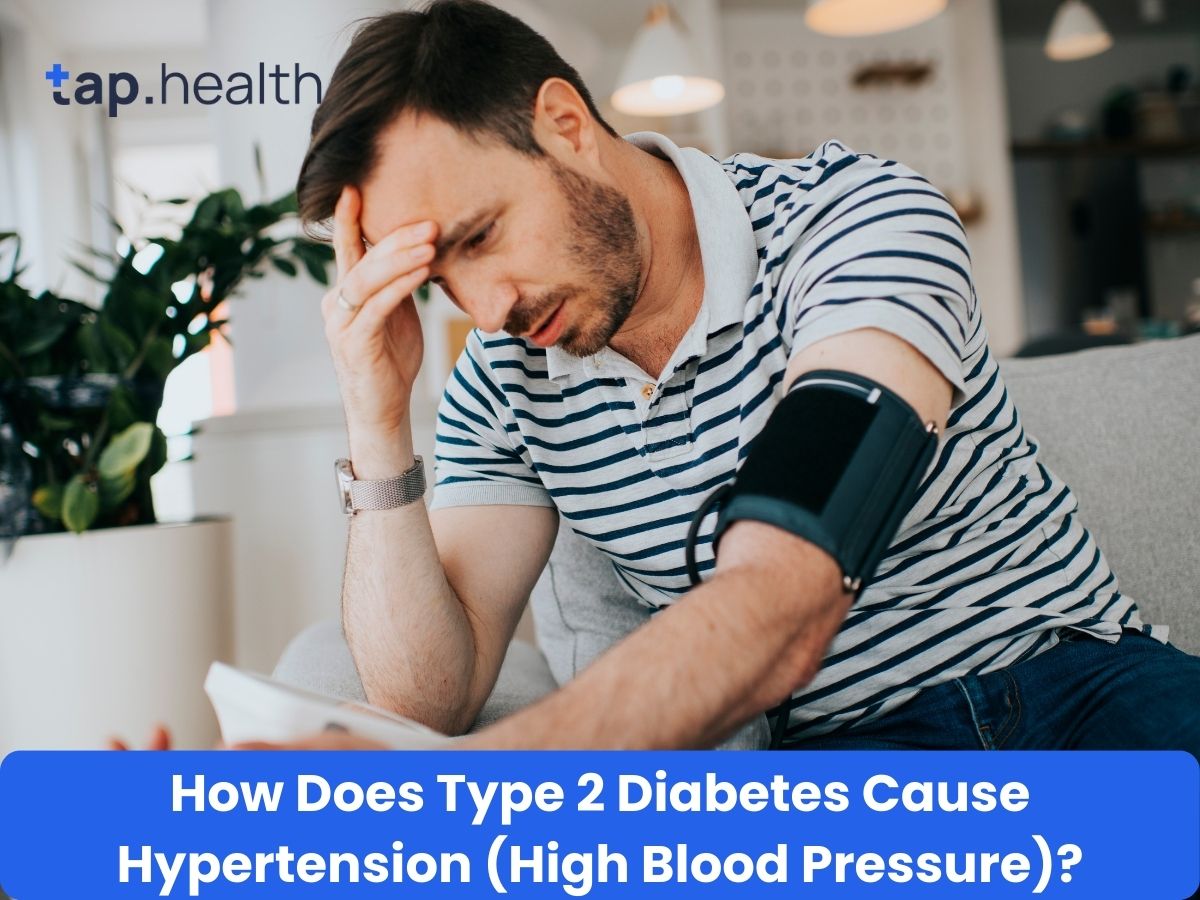Table of Contents
- Understanding Heart Palpitations with Diabetes
- Diabetes and Heart Palpitations: A Comprehensive Guide
- What Causes Irregular Heartbeats in Diabetics?
- Symptoms of Diabetes-Related Cardiac Arrhythmias
- Managing Heart Palpitations if You Have Diabetes
- Frequently Asked Questions
- References
Experiencing a fluttering or racing heart? If you have diabetes, this could be more than just a fleeting feeling. Understanding diabetes-related heart palpitations: symptoms and causes is crucial for managing your overall health and well-being. These irregular heartbeats can be a sign of several underlying issues, from simple electrolyte imbalances to more serious complications. This blog post will delve into the various reasons why you might experience heart palpitations with diabetes, helping you identify potential symptoms and understand the next steps to take. Let’s explore this important connection between diabetes and heart health together.
Understanding Heart Palpitations with Diabetes
Heart palpitations, that unsettling feeling of a racing, fluttering, or pounding heart, are a common concern, particularly among individuals with diabetes. This is especially relevant in India and other tropical countries where diabetes prevalence is significant. According to the International Diabetes Federation Diabetes Atlas, a substantial 61% of people with diabetes are aged between 20-64 years, highlighting the importance of early awareness and management in this crucial working-age demographic. Experiencing these palpitations can be alarming, but understanding their potential causes can help alleviate anxiety and encourage prompt medical attention.
Causes of Heart Palpitations in Diabetics
Several factors linked to diabetes can trigger heart palpitations. High blood sugar levels (hyperglycemia), a hallmark of diabetes, can directly affect the heart’s rhythm. Furthermore, poorly controlled diabetes can lead to complications like autonomic neuropathy, damaging the nerves that regulate heart rate. This nerve damage can result in irregular heartbeats. Additionally, underlying conditions often associated with diabetes, such as hypertension (high blood pressure) and thyroid problems, can also contribute to palpitations. In some cases, medications used to manage diabetes or other health conditions might also have heart palpitations as a side effect. These factors are often exacerbated by high temperatures and humidity prevalent in many Indian and tropical regions, adding another layer of complexity. Understanding how diabetes affects blood flow is also crucial in understanding heart palpitations; you can read more about this in our article, How Does Diabetes Affect Blood Flow?.
Recognizing and Addressing the Issue
Recognizing the symptoms of heart palpitations is crucial. This includes a rapid, irregular, or forceful heartbeat, often accompanied by chest discomfort, dizziness, shortness of breath, or anxiety. If you experience these symptoms, especially if you have diabetes, seek immediate medical attention. Your doctor can perform a thorough evaluation, including an electrocardiogram (ECG) and other tests to determine the underlying cause and recommend appropriate treatment. This might involve managing blood sugar levels more effectively, addressing underlying health conditions, or adjusting medications. Regular check-ups and proactive management of your diabetes are key to preventing and managing heart palpitations. It’s also important to understand the connection between diabetes and conditions like tachycardia. For more information, please see our article on Does Diabetes Cause Tachycardia?.
Next Steps for Indian and Tropical Region Residents
Living with diabetes in hot and humid climates requires extra vigilance. Staying hydrated, avoiding strenuous activity during peak heat, and adhering strictly to your prescribed diabetes management plan are crucial steps to minimize the risk of heart palpitations and other complications. Consult your doctor or a qualified healthcare professional for personalized advice and support. Your health is paramount, and proactive management is your best defense.
Diabetes and Heart Palpitations: A Comprehensive Guide
Experiencing heart palpitations alongside diabetes can be alarming. The connection is significant, and understanding the underlying causes is crucial for effective management, particularly in regions like India and other tropical countries where diabetes prevalence is high. Diabetes significantly increases the risk of various cardiovascular complications, making heart palpitations a serious concern.
Understanding the Link Between Diabetes and Heart Palpitations
Several factors contribute to this link. High blood sugar levels damage nerves, including those regulating heart rhythm, potentially leading to irregular heartbeats or palpitations. Furthermore, diabetes often elevates blood pressure and cholesterol, increasing the strain on the heart and triggering palpitations. The increased risk of sleep apnea, linked to a 70% higher chance in diabetics, further complicates matters. Sleep apnea, characterized by pauses in breathing during sleep, reduces oxygen levels and can cause irregular heart rhythms, manifesting as palpitations.
Recognizing Symptoms and Seeking Help
Heart palpitations can manifest as a racing heart, fluttering sensation in the chest, or a skipped beat. If you experience frequent or severe palpitations, especially alongside other symptoms like chest pain or shortness of breath, seek immediate medical attention. Early diagnosis and intervention are vital in preventing more serious cardiovascular complications.
Managing Heart Palpitations in Tropical Climates
In hot and humid tropical climates, dehydration can exacerbate heart palpitations in individuals with diabetes. Staying well-hydrated, maintaining a healthy diet, and managing blood sugar levels are crucial. Regular exercise, appropriate for your health condition, can improve overall cardiovascular health and help reduce the risk of palpitations. Consult your doctor to develop a personalized management plan tailored to your specific needs and the climate you live in. Don’t hesitate to seek advice from healthcare professionals regarding effective strategies for managing diabetes and associated heart palpitations, especially relevant to the unique challenges of your region. For more information on managing diabetes as you age, read our comprehensive guide, Managing Diabetes as You Age: Challenges and Solutions. And to learn proactive steps to protect your heart, check out Protect Your Heart from Diabetes: 5 Essential Steps.
What Causes Irregular Heartbeats in Diabetics?
Irregular heartbeats, or palpitations, are a concerning symptom that can affect people with diabetes. The link between diabetes and heart problems is significant, and understanding the causes is crucial, especially considering that 50% of diabetes cases worldwide are undiagnosed, a statistic alarmingly prevalent in many Indian and tropical countries. This often leads to delayed diagnosis and management of potentially serious cardiac complications.
Underlying Mechanisms
Several factors contribute to irregular heartbeats in individuals with diabetes. High blood sugar levels, a hallmark of both type 1 and type 2 diabetes, can damage nerves throughout the body, including those controlling the heart’s rhythm. This nerve damage, or neuropathy, can disrupt the heart’s electrical signals, leading to palpitations, arrhythmias, and other heart rhythm disturbances. Furthermore, diabetes increases the risk of high blood pressure and high cholesterol, both of which significantly strain the cardiovascular system and can trigger irregular heartbeats. In tropical climates, factors like heat and dehydration can exacerbate these issues. Understanding the connection between blood sugar fluctuations and other symptoms, like fatigue, is also important. For example, you might find our article on Why Do Diabetics Get Sleepy After Eating? insightful.
Symptoms & What to Do
Symptoms of diabetes-related palpitations can range from occasional fluttering sensations to rapid, forceful heartbeats. If you experience these, especially alongside other diabetes symptoms like increased thirst or frequent urination, it’s crucial to seek immediate medical attention. Early diagnosis and management are key to preventing more serious cardiac events. Regular check-ups with your doctor, including blood sugar and heart health screenings, are vital for individuals with diabetes, particularly in high-risk regions.
Taking Control
Managing blood sugar levels effectively is paramount to reducing the risk of heart complications. This includes following a prescribed diet, regular exercise, and adhering to any medication plan. In India and other tropical countries, incorporating culturally appropriate dietary choices and staying hydrated are essential components of effective diabetes management. Don’t hesitate to consult with your doctor or a registered dietitian to create a personalized plan suitable for your lifestyle and geographic location. It’s also important to be aware of other potential complications of diabetes. For instance, you may find our article on Can Diabetes Cause Heel Pain? helpful in understanding the broader impact of the condition.
Symptoms of Diabetes-Related Cardiac Arrhythmias
Diabetes significantly increases the risk of heart problems, including irregular heartbeats or cardiac arrhythmias. These arrhythmias can manifest in various ways, impacting your overall health and well-being, particularly in individuals living in hot and humid climates prevalent in many Indian and tropical countries. Understanding these symptoms is crucial for early detection and management.
Common Symptoms:
Experiencing palpitations, a racing or fluttering heartbeat, is a key indicator. This can range from a mild sensation of an irregular heartbeat to a feeling of intense pounding in your chest. Other symptoms include dizziness or lightheadedness, which can be particularly dangerous, especially in hot weather common in many parts of India and other tropical regions. Shortness of breath, chest pain, or discomfort should also raise concerns. Feeling unusually fatigued or weak can also be a sign of underlying cardiac issues exacerbated by diabetes. Note that these symptoms can be subtle and easily dismissed, highlighting the importance of regular check-ups.
Understanding the Connection:
The link between diabetes and heart arrhythmias is complex. High blood sugar levels damage blood vessels and nerves, impacting the heart’s electrical system and its ability to regulate its rhythm. This is further complicated by the high prevalence of diabetic nephropathy, a kidney disease affecting nearly 30% of people with diabetes. Kidney complications can further destabilize the heart’s rhythm, emphasizing the need for comprehensive diabetes management. Early diagnosis and effective treatment are key to mitigating these risks. For more information on early detection, you might find 10 Early Signs and Symptoms of Diabetes? helpful.
Seeking Help:
If you experience any of these symptoms, especially if you have diabetes, consult a doctor immediately. Prompt medical attention is vital, particularly in the context of the hot and humid climates prevalent in India and other tropical countries where heat stress can further complicate cardiac issues. Don’t hesitate to seek medical advice; your heart health is paramount. It’s also important to understand the many ways diabetes can manifest; for example, did you know that diabetes can cause cramps?
Managing Heart Palpitations if You Have Diabetes
Experiencing heart palpitations alongside diabetes can be alarming, especially given that over 60% of people with diabetes in India also have hypertension, according to the International Diabetes Federation (IDF). Understanding the connection between these conditions is crucial for effective management. Heart palpitations, that fluttering or racing feeling in your chest, can stem from various factors in individuals with diabetes. These include fluctuations in blood sugar levels, impacting the heart’s rhythm, and the increased risk of underlying heart conditions often associated with diabetes. High blood pressure, prevalent in many Indian and tropical populations, further exacerbates this risk.
Addressing Heart Palpitations: Practical Steps
Managing blood sugar levels effectively is paramount. Regular blood glucose monitoring, following a prescribed diabetic diet, and adhering to your medication regimen are essential. Maintaining a healthy lifestyle, including regular exercise (suitable for your condition) and stress management techniques like yoga or meditation, can significantly reduce the frequency and intensity of palpitations. Controlling hypertension is equally crucial. This often involves lifestyle modifications alongside prescribed medication. For more comprehensive strategies, you might find our guide on 10 Proven Tips for Effective Diabetes Management helpful.
Seeking Professional Guidance
It’s vital to consult your doctor if you experience frequent or severe heart palpitations. They can conduct a thorough assessment, identify the underlying cause, and recommend appropriate treatment. Ignoring the issue could lead to serious health complications. In many Indian and tropical contexts, access to quality healthcare can be a challenge; proactive management and regular check-ups are even more important. Don’t hesitate to seek help; your heart health is a priority. Remember that managing cholesterol is also vital for heart health; check out our blog on How to Manage Cholesterol Levels with Diabetes? for more information.
Frequently Asked Questions on Understanding Diabetes-Related Heart Palpitations
Q1. What are the common causes of heart palpitations in people with diabetes?
High blood sugar, nerve damage affecting heart rate (autonomic neuropathy), high blood pressure (hypertension), thyroid problems, and some diabetes medications can all trigger heart palpitations.
Q2. What are the symptoms of diabetes-related heart palpitations?
Symptoms include a rapid, irregular, or forceful heartbeat, chest discomfort, dizziness, shortness of breath, and anxiety. If you experience these, seek immediate medical attention.
Q3. How can I prevent or manage heart palpitations if I have diabetes?
Managing your blood sugar levels effectively is crucial. Addressing any underlying conditions like hypertension or thyroid problems is also important. Your doctor may adjust your medications. In hot climates, stay hydrated and avoid strenuous activity during the hottest parts of the day.
Q4. When should I seek immediate medical attention for heart palpitations?
Seek immediate medical attention if you experience any concerning symptoms like a rapid, irregular, or forceful heartbeat, especially if accompanied by chest discomfort, dizziness, shortness of breath, or anxiety.
Q5. What role does regular check-up play in managing diabetes-related heart palpitations?
Regular check-ups with your doctor are essential for monitoring your blood sugar, managing underlying conditions, and adjusting medications as needed. Proactive diabetes management is key to preventing and managing heart palpitations.
References
- A Practical Guide to Integrated Type 2 Diabetes Care: https://www.hse.ie/eng/services/list/2/primarycare/east-coast-diabetes-service/management-of-type-2-diabetes/diabetes-and-pregnancy/icgp-guide-to-integrated-type-2.pdf
- What is Diabetes: https://www.medschool.lsuhsc.edu/genetics/docs/DIABETES.pdf



